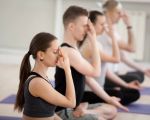Benefits of Yoga for Post-Workout Recovery: Enhance Your Recovery Routine
- Why Yoga Is Important for Post-Workout Recovery
- Yoga Benefits for Muscle Recovery
- How Yoga Reduces Stress After Exercise
- Yoga Poses to Aid Post-Workout Recovery
- Real-Life Experience with Yoga and Recovery
- Incorporating Yoga into Your Recovery Routine
Why Yoga Is Important for Post-Workout Recovery
After an intense workout, your body needs time to recover. While rest and hydration are essential, incorporating yoga into your post-workout routine can accelerate recovery and enhance your performance over time. Yoga combines flexibility, breathing techniques, and relaxation, all of which play an important role in reducing muscle soreness, improving mobility, and preventing injury.
Yoga is especially beneficial after high-intensity workouts or strength training, which often cause tightness and stiffness in the muscles. The gentle stretching and relaxation that yoga offers can help alleviate tension, reduce inflammation, and promote faster healing. Whether you’re a seasoned athlete or a casual fitness enthusiast, yoga is a great way to support your body’s natural recovery process and improve your overall fitness.
Yoga Benefits for Muscle Recovery
One of the primary benefits of yoga for post-workout recovery is its ability to enhance muscle flexibility and reduce soreness. Here’s how yoga can aid in muscle recovery:
- Stretching and Lengthening: Yoga helps to stretch and lengthen the muscles that may have become tight during exercise. This helps to maintain muscle flexibility and prevents the muscles from becoming overly stiff, which can hinder future workouts.
- Increased Blood Flow: The deep breathing and controlled movements in yoga encourage blood circulation, which helps to transport oxygen and nutrients to your muscles. This increased blood flow aids in muscle repair and reduces recovery time.
- Reduced Muscle Tension: Post-workout yoga focuses on releasing tension, which is particularly helpful for areas that commonly become tight, such as the hips, hamstrings, and shoulders. These releases promote better mobility and a more relaxed state in the body.
How Yoga Reduces Stress After Exercise
Intense exercise can cause a build-up of stress in the body, especially when it comes to high-impact sports or heavy lifting. Yoga is an excellent way to calm the nervous system and alleviate the stress that physical activity can place on the body. Through focused breathing exercises (pranayama), yoga helps activate the parasympathetic nervous system, which is responsible for the “rest and digest” response.
By promoting relaxation and reducing cortisol (the stress hormone), yoga helps to lower overall stress levels in the body. This not only enhances the recovery process but also helps improve mental clarity and emotional well-being. After a workout, practicing yoga can provide a much-needed mental reset and emotional balance, allowing you to feel rejuvenated and ready for your next session.
Yoga Poses to Aid Post-Workout Recovery
Certain yoga poses are particularly beneficial for post-workout recovery, as they help target the areas that are most likely to be sore or tight after exercise. Here are a few poses to incorporate into your post-workout routine:
- Downward-Facing Dog: This classic pose stretches the hamstrings, calves, and shoulders. It helps relieve tightness in the lower body and upper back, promoting overall flexibility.
- Child’s Pose: This resting pose allows for deep stretching of the back, hips, and thighs. It’s perfect for relaxing the body and gently easing muscle tension after a workout.
- Cat-Cow Pose: The Cat-Cow sequence is excellent for warming up the spine and releasing tension in the back. This dynamic flow between arching and rounding the back increases mobility and helps prevent stiffness.
- Pigeon Pose: The Pigeon pose is particularly effective for stretching the hips, glutes, and lower back. It’s great for targeting areas that can become tight after lower-body exercises like squats or running.
- Reclining Hand-to-Big-Toe Pose: This pose stretches the hamstrings and calves while also helping to open the hips and lower back. It’s a great way to release tension after intense leg workouts or long cardio sessions.
Real-Life Experience with Yoga and Recovery
Take the experience of Emily, a dedicated runner who found that her post-run recovery was taking longer than she liked. After adopting a yoga routine focused on stretching, breathing, and releasing muscle tension, she noticed a significant improvement. Emily began to incorporate poses like Downward-Facing Dog and Child’s Pose into her routine after every run, and within weeks, her muscles felt less tight, and she experienced fewer aches and pains. Yoga helped her recover faster, and she even noticed an improvement in her flexibility and stamina during her runs.
Emily’s story highlights how beneficial yoga can be for recovery, not just in reducing soreness, but also in preventing injury. By including yoga in her post-workout routine, she was able to enhance her overall fitness and stay injury-free while still pushing herself in her running goals.
Incorporating Yoga into Your Recovery Routine
Integrating yoga into your post-workout recovery routine doesn’t require a significant time commitment. Even 15 to 20 minutes of focused yoga practice after a workout can make a difference in how quickly your body recovers. Here’s how to get started:
- Start Slow: Begin with gentle poses that focus on relaxing the muscles. Avoid deep, intense stretches immediately after a tough workout. Instead, focus on poses that promote relaxation and mobility.
- Focus on Breathing: Incorporate deep breathing exercises (pranayama) during your yoga practice to reduce stress and help the body relax. Focus on slow, controlled breaths to activate the parasympathetic nervous system.
- Consistency Is Key: Practice yoga consistently to see the best results. Even a short, daily routine can help you improve flexibility, reduce recovery time, and prevent injuries.
If you’re ready to enhance your post-workout recovery with yoga, visit Free Yoga Links for great resources, videos, and tips to get started. Incorporating yoga into your fitness routine can not only improve your recovery time but also promote long-term health and wellness.








